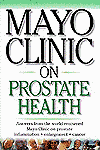
|
A selection from:
Mayo Clinic on Prostate Health
Chapter 7
What Are Your Options?
Finding out you have cancer can lead to panic. You may feel as
if you need to make an instant decision and begin your treatment
right away However/ because prostate cancer is often a
slow-growing cancer/ there's generally no need to rush.
Give yourself a little time to gather some information and
consider your treatment options. You may want to visit the patient
education library, if your medical center has one. Or you can stop at
your local library or check out well-respected sources on the
Internet, such as the American Cancer Society or American
Urological Association. Once you've read up on your condition,
write down questions you want to ask your doctor before the two
of you decide on a treatment plan.
You also may find it helpful to take a family member or friend
with you to your next appointment. He or she can remind you of
important questions you want to ask. That person also can listen
intently and help you recall the discussion afterward, including
important points made.
Often, there's more than one way to treat prostate cancer, and
you might even use a "one-two punch," a combination of
treatments such as surgery followed by radiation. Which treatment you
and your doctor choose will depend on several factors, such as
how fast-growing the cancer is, how much it has spread, your age,
and your health, as well as the benefits and potential side effects
of the treatment.
Letting the cancer alone
Because blood tests can now detect prostate cancer at a very early
stage, more men are being given an option that's less traumatic
than traditional treatments. It goes by many names, such as
"watchful waiting," "observation" or "expectant therapy." You do
nothing except keep a close watch on the cancer with regular blood
tests and rectal exams, performed about every 6 months. You may
also need to have occasional biopsies.
If you're fairly young and healthy in your 50s or 60s, your
doctor probably won't recommend this approach. Because of your
age, the cancer has many years to grow, and even a small, slow-
growing cancer might eventually reach the point when it needs
additional treatment. The cancer cells could also unexpectedly
become aggressive and spread so much that a cure becomes
difficult or impossible.
However, if you're age 70 or older and the cancer is small and
slow-growing, watchful waiting might be an option. Chances are
good that without any form of treatment, you'll live 10 more
years without the cancer spreading, or without it causing you
problems. With careful monitoring, you'd be able to act quickly if
the cancer did turn aggressive, and treatment became necessary to
stop its growth.
Are you a candidate for watchful waiting?
• You're age 70 or older with a small, low-grade cancer (Gleason
score of 2 to 4).
• The cancer is confined to the prostate and you want time to
think about your options.
• You aren't able to withstand the side effects of treatment for
age or health reasons.
• Your future life expectancy is less than 10 years, because of
another condition.
What are the benefits?
• You avoid the risks associated with other treatments, such as
impotence or incontinence.
• Watchful waiting buys you time to consider treatment options.
It can take several years for a tiny tumor to double in size, and
you can use this time to your benefit.
• It's the least expensive option, requiring only occasional exams
and tests.
What are the disadvantages?
• The cancer can grow while you wait. Though rare, a slow-
growing cancer can turn into a faster-growing cancer in
weeks to months. Among men with a Gleason score of 2 to 4,
about 2 percent develop cancer outside the prostate within
the first year.
• You may become the "walking worried," always anxious
about your cancer and preoccupied with your tests and
condition. Though more aggressive treatment has risks, it
reduces the fear that you may be gambling with your life.
[The chapter continues with "Removing your prostate gland."]
|
|